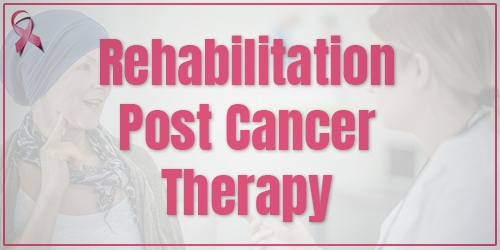Rehabilitation post-cancer therapy is a crucial aspect of cancer care that focuses on restoring physical, emotional, and functional well-being in cancer survivors. Cancer treatment, including surgery, chemotherapy, radiation therapy, and immunotherapy, can have significant physical and psychological impacts on patients. Rehabilitation aims to address these effects and improve overall quality of life for cancer survivors.
Physical Rehabilitation:
Physical rehabilitation plays a vital role in helping cancer survivors regain strength, mobility, and independence. It may involve exercises, physical therapy, and occupational therapy tailored to the individual's needs and treatment history. For example, breast cancer survivors may undergo physical therapy to improve arm mobility and reduce lymphedema following surgery.
Exercise Programs:
Structured exercise programs are an integral part of cancer rehabilitation. Exercise has been shown to improve physical function, reduce fatigue, and enhance overall well-being in cancer survivors. These programs may include aerobic exercises, strength training, flexibility exercises, and balance training. Exercise can also help manage treatment-related side effects such as muscle weakness, joint stiffness, and neuropathy.
Pain Management:
Cancer treatment can sometimes lead to chronic pain or discomfort. Rehabilitation programs often include pain management strategies such as medication, physical therapy modalities like heat or cold therapy, massage, acupuncture, and relaxation techniques to alleviate pain and improve quality of life.
Nutritional Counseling:
Nutritional counseling is essential for cancer survivors to maintain a healthy diet and address any nutritional deficiencies or changes resulting from cancer treatment. Registered dietitians work with patients to develop personalized nutrition plans that support recovery, manage side effects, and promote overall wellness.
Psychological Support:
Cancer diagnosis and treatment can have a profound impact on mental health, leading to anxiety, depression, fear, and stress. Psychological support services, such as counseling, support groups, and mindfulness-based interventions, are crucial components of rehabilitation post-cancer therapy. These services help patients cope with emotional challenges, improve coping skills, and enhance resilience.
Speech and Swallowing Therapy:
Some cancer treatments, especially those involving the head and neck area, can affect speech and swallowing functions. Speech-language pathologists provide therapy to improve speech clarity, voice quality, and swallowing abilities, helping patients regain functional communication and nutritional intake.
Lymphedema Management:
Lymphedema, swelling caused by lymphatic system damage during cancer treatment, is a common concern for survivors. Rehabilitation programs may include lymphedema management techniques such as compression therapy, manual lymphatic drainage, exercise, and skin care to reduce swelling and improve lymphatic function.
Social and Vocational Rehabilitation:
Reintegration into social and work environments is an essential aspect of cancer rehabilitation. Social workers and vocational counselors help patients navigate social challenges, address financial concerns, access community resources, and explore vocational rehabilitation options to facilitate a smooth transition back to daily life and work responsibilities.
Survivorship Care Plans:
Comprehensive rehabilitation post-cancer therapy includes the development of survivorship care plans. These plans outline personalized follow-up care, monitoring for potential late effects of treatment, cancer surveillance, health promotion strategies, and ongoing support to optimize long-term health and well-being.
Conclusion
In conclusion, rehabilitation post-cancer therapy encompasses a multidisciplinary approach to address the diverse needs of cancer survivors. It focuses on physical recovery, emotional well-being, pain management, nutritional support, psychological resilience, functional independence, and social reintegration. By providing comprehensive rehabilitation services, healthcare providers can empower cancer survivors to live fulfilling lives and thrive beyond cancer treatment.














